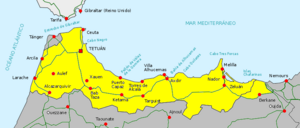Africanist (Spain) facts for kids
Africanists (Spanish: Africanistas) were a group of people, mostly in the military, who strongly believed Spain should have a big role in Africa. This was especially true in the early 1900s.
Spain had been in Africa for many centuries. But it was after the "New Imperialism" period and the Berlin Conference in 1884 that Spain really started to focus on African lands. The idea of Africanism grew mainly after Spain lost Cuba, the Philippines, Puerto Rico, and other islands in 1898. This happened because of the Spanish–American War.
Africanists wanted to make up for these losses by getting more land and power in Africa. Spain's efforts to colonize Africa were smaller compared to other European countries. Even after losing its colonies in the Americas and Pacific, Spain didn't have much public support to become a big empire again. The Spanish economy got better quickly after the war, and most people weren't interested in having an empire anymore. Countries like Italy, which started colonizing later, gained more land than Spain because their people supported the idea of an empire much more.
Within the army, Africanist officers often had very traditional and strong beliefs. They had extreme pride in their country and didn't like democratic ideas. This sometimes linked them to a type of strong, controlling government called Fascism. Some historians say that the Africanists' ideas, mixed with worries about Spain's people "losing their way," became a key part of the "crusade" idea behind the military takeover attempt in 1936.
Contents
Spain's Role in Morocco
In 1912, Spain decided to set up a protectorate in Morocco. This meant Spain would control some parts of Morocco. The Spanish government used its military to manage this new territory. After Spain became involved in Morocco, "Africanism" became a way of thinking within the army stationed there.
Many soldiers, especially the officers, became very interested in Spain's presence in Morocco. It was easier for both officers and regular soldiers to get promoted there. Promotions were based on how well they performed and their military achievements. Many officers wanted a successful military career, which made more people support the Africanist movement.
Africanists vs. Junteros
There was a growing competition within the Spanish military. On one side were the Africanists, who were soldiers stationed in Africa. On the other side were the Junteros, who were soldiers stationed in mainland Spain.
Another difference was that Africanists were mainly infantry (foot soldiers) and cavalry (soldiers on horseback). Junteros were mostly artillery units (soldiers who use big guns) and most of the military's officers.
The rivalry started because of a disagreement. After the Spanish-Moroccan wars, the government started giving soldiers in Morocco higher pay and faster promotions. Many Junteros felt jealous because they were paid less and felt they were losing importance. The Junteros tried to block any help or support for the soldiers in Africa to weaken the Africanists.
This rivalry also played a part in the Spanish Civil War. The Junteros supported the Republicans, while the Africanists supported the rebels. Francisco Franco was a very important leader in the Africanist movement.
Why Africanists Supported an Empire
Many Africanists supported the idea of Spain having an empire because they felt a strong sense of national pride. One reason they gave for Spain's control in Africa was Hispanidad. This was the idea that Spanish-speaking and Spanish-culture people were better than non-Europeans.
Another reason Africanists used to explain why Spain should control Morocco was Parentesco. This idea claimed that Spanish people and Moroccans were similar in their background, and so they should be united.
Africanists and the Public
Most ordinary Spanish people were not interested in Spain controlling places like Spanish Morocco. They also felt upset with the Africanists and the military in general. This was because the military often stopped protests by ordinary people.
Because they felt separated from mainland Spain, Africanists started to adopt some traditions of the Berbers in Morocco. They respected the Berber people's military strength and bravery.
Famous Africanists
- Alfonso XIII – King of Spain from 1886 to 1931
- Prince Fernando de Baviera – A Spanish prince
- Alfonso de Orleans – A Spanish prince
- Manuel Fernández Silvestre – A Spanish general
- Damaso Berenguer – A Spanish general
- Alfredo Kindelán – Started the Spanish Air Force
- José Sanjurjo
- Francisco Franco
- Emilio Mola
- José Millán-Astray
- Juan Yagüe
- Emilio Blanco Izaga
- José Marina
- Francisco Gómez Jordana
See also
 In Spanish: Africanismo español para niños
In Spanish: Africanismo español para niños
 | May Edward Chinn |
 | Rebecca Cole |
 | Alexa Canady |
 | Dorothy Lavinia Brown |


